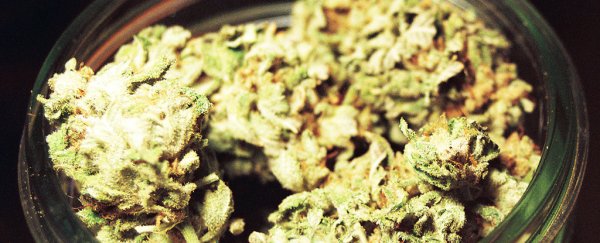Researchers say the effects of radiation in outer space could be enough to dampen the highs you get from smoking marijuana – so your weed might be pretty much useless if you decide to go off-planet.
Scientists from US and Hungary found that signalling within the brain can be disrupted by the high-energy particles whizzing through space – and in particular, the parts of the brain linked to cannabis highs.
Getting high might not be the first thought on every astronaut's mind, but the study – led by Sang-Hun Lee from the University of California – is the latest to show how space travel could influence the brain, and how humans can stay healthy on long interstellar journeys.
"Before sending humans on … long-term voyages in space, the immediate and long-term health risks caused by exposure to space radiation fields must be carefully evaluated," the team explains in their paper.
The problem is that the Sun keeps pumping out an endless stream of dangerous cosmic rays: high-energy protons that are mostly deflected by Earth's magnetic field.
Up in space, though, there's no such protection, which is bad news for our bodies on long space journeys.
In this study, researchers looked at the effects of these protons on the hippocampus part of the brain in mice, which handles memories and spatial navigation.
They found that the radiation interfered with the workings of the endocannabinoid receptors in the organ – the same parts affected by smoking a joint of cannabis.
In fact, an active ingredient in marijuana called tetrahydrocannabinol (THC) actually mimics the function of endocannabinoid molecules in the brain, boosting some of the signals along key pathways in our heads.
So when we smoke pot, the endocannabinoid receptors respond to THC to give us feelings of pleasure and relaxation – but the parts of the brain responsible for motor control, memory, cognition, and perception are all affected too.
Any kind of interference with these receptors by cosmic radiation would mess with the effects of a marijuana high as well, the scientists say.
In fact, the hippocampus disruption in the mouse brains were still noticeable months after the original exposure, according to the study.
Not only is that useful information for scientists trying to figure out how to keep us safe in space, it could also help us decide whether to allow smoking weed on trips to Mars – and with missions expected to take months or even years, that might well be an issue that comes up eventually.
As one of the team, neuroscientist Ivan Soltesz from Stanford University, told Bruce Goldman at ScienceBlog: "You laugh now, but on a long trip to Mars, recreation and medical marijuana use will likely become a highly controversial issue, so I stand by the utmost importance of the study."
The research has been published in Brain Structure and Function.
